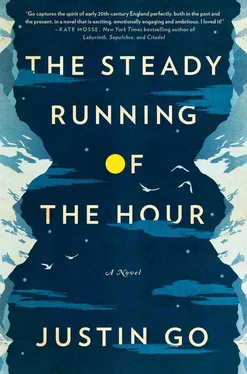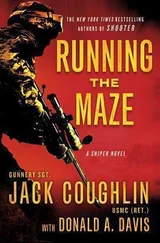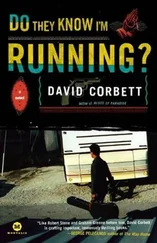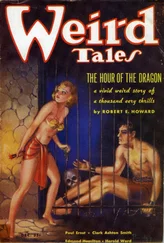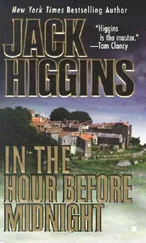Ashley nods and takes a drink of whisky. Absently he watches the barman polishing glasses. Ashley reaches into his coat and takes out his pocketbook.
— My name’s Walsingham. My rooms are just around the corner, on Lansdowne Terrace.
Ashley counts out five ten-pound banknotes. He sets the bills on the bar.
— Look for me in the papers, Ashley continues, because I’m going to climb Mount Everest. And when I get back to London, the first thing I’m going to do is come into this pub and use this money to buy champagne for everyone who happens to be in here. On both sides of this screen. Have you any champagne?
— No sir.
— Well, no matter, I’ll buy anyone whatever they like. But if I don’t climb the mountain, I’ll be back to reclaim this money as a consolation prize. You lose nothing either way. How does that strike you?
— Very generous, sir.
Ashley pushes the notes across the bar. He shakes hands with the publican.
— One more thing. If I don’t come back at all — and you’ll hear if I don’t — you’re to take this money and buy everyone in the public bar drinks for the whole night, the same night you hear I’m dead. Remember, all the drinks until the money’s gone.
The publican hesitates, perhaps finding something distasteful in this last agreement. But in the end Ashley persuades him.

When Ashley leaves the pub he is teetering only slightly. He pauses with his heels perched on the curb, testing his balance, his eyes searching for the moon above. Long trails of clouds coast across the night sky.
Ashley gropes through his coat pockets. He has left behind his wallet somewhere — in the club at luncheon perhaps, or on the counter at the bank, or on the bar of the public house. No, here it is. The wallet in hand, Ashley crosses Guilford Street and turns onto Lansdowne Terrace. With some difficulty he unlocks his front door, climbing the stairs two at a time. He sinks into a deep armchair in the corner of the sitting room, not his own chair, for the flat had come ready furnished. There is an electric lamp beside him with a mica shade, but Ashley does not switch it on.
I don’t need the light , he thinks. I can do without it all the long night .
The arc light flares outside the uncurtained window, a corona of brilliant white sufficient for Ashley to read his folded newspaper. But the articles fail to hold his attention. He is anything but tired. He could take a book from the bedroom, but he knows it would not divert him. Ashley thinks of his fifty pounds, drawn out today at a counter in Cannon Street, the banknotes now tucked in the pocket of the bullnecked publican. He will return to the bank tomorrow to draw more cash. He will have a different clerk, or if he has the same clerk, no one would know he had squandered the last sum on a silly wager with a publican.
Ashley throws the newspaper onto the floor. He thinks of the five years he has been gone from England. The interval was nothing now that he had returned and it would have been the same had he been gone a decade. So too with the training. Now that it was over its hardships seemed nearly fictitious, save for the lean sinews of his build, the way he hardly drew a heavy breath from any kind of exertion.
Ashley thinks of his body as it is now, alone in the armchair in the darkened room looking onto Coram’s Fields, his trunk and valises still unpacked in the corner. The wager: fifty pounds. And something else, the reason he had been gone five years. The reason he set himself against any trial he felt unequal to. Ashley dares not consider it too directly, for like a solar eclipse viewed through smoked glasses, it is only by gazing with an oblique perspective that he can preserve his sight.
It can’t only be her , he thinks. It must have been part of me before we ever met.
But if it is not only her, it is somehow still twinned with the memory of her, for there was no other force that could lend him such resilience. And yet the lunacy of it all. Staking your whole being on a frivolous dare, imagining you could master the Dent d’Hérens or the Rub’ al Khali or Mount Everest, when you were but a child before them, escaping only by their fickle mercy. Accomplishing nothing save some indulgent acrobatics of the ego. Climbing a mountain just to say you done it. Ashley strains to remember how it had been different in the early years, when he had loved simply to be among wild places, without the need to compete against them. Had the war changed this? That was too facile, for he had always loved to win, and yet this obsession with conquest seemed to have come after the war — not even conquest but only the prevention of failure, anything but a surrender to the superior forces that enveloped him.
It is a great mistake, Ashley knows. But if he does not go on — if he loses nerve or his courage falters — he will be unable to stand himself. He fears that most of all, more than death even. It was like the desert had been, at first only the question of what he was after, the notion of a city lost among the sands, awaiting him. Then later, once he knew he would never find that spectral city, only the question of himself — of what he could endure without giving in, of what it meant to persevere over a trifle. Imogen is no trifle. But it was even madder with her, the months of futile searching after the war, pleading for answers from her family and friends when he knew they would never tell him anything, when he doubted they knew anything themselves. By the time Ashley left for Kenya he had given this up, for it made him sick to look for her when he knew she did not want to be found.
Ashley remembers the first night he spent with Imogen, after they looked for the key in Regent’s Park. They walked across the whole West End until the sky turned sapphire over the rooftops on Haymarket and Imogen put her arm through Ashley’s. In the dark window of a tobacconist he caught their reflection, Imogen walking very close to him and clasping his arm tightly. A boy came up the street on a bicycle loaded with newspapers, staring for long seconds as he rode past, and for the first time in his life Ashley felt what it was to be seen with the woman he loved. He had thought he would know that feeling for the rest of his life. But it had not even lasted a week.
What sets Ashley apart? What is the reason he will not settle to writing poetry and trimming his rosebushes in Berkshire, or taking lamb chops for luncheon every day at a club on Pall Mall? Is it strength or only stubbornness, only foolish pride that keeps him so? Whatever it is, it had dangled contentment always at arm’s length, while he supposes Imogen achieved happiness for herself long ago, without the need to risk her life to feel alive, nor to know who she is. And who would Ashley be without his love for her, without this reckless ardor that made him dare and waver and dare again?
Ashley switches on the lamp and opens a book of Nepali phrases. He will study these until he falls asleep. It will all be clear soon enough.

It’s ten in the evening in Düsseldorf when I board the night train to Berlin. I’ve been on trains for five hours now and I won’t reach Berlin until morning.
There are five other bunks in my sleeper and it’s hot and stuffy inside. After a few hours in bed I can’t sleep anymore, so I walk to the dining compartment. The snack bar is shuttered, but there’s a coffee machine and I stay up until dawn drinking Milchkaffee from small plastic cups, thinking about Berlin and Everest and Ashley’s telegram. I pull out my notebook and pen.
Читать дальше
